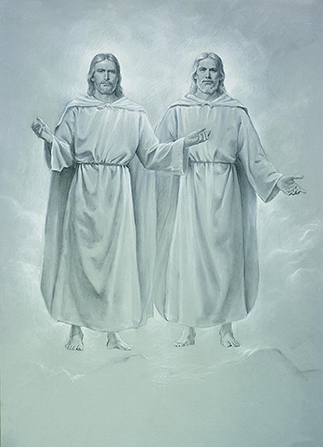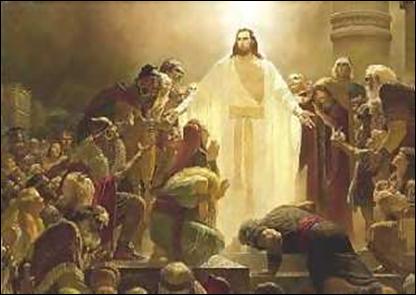There was an occasion, I suspect one of several such, where certain of the Scribes (transcribers and interpreters of Scripture, according to their philosophical views) and the Pharisees (teachers of rigid, extra-scriptural philosophical overlays on The Law of Moses, precursors to modern Rabbis) made a request of Jesus (Matthew 12:38-42):
38: "...Master, we would seek a sign from thee. 39: But [Jesus] answered and said unto them, An evil and adulterous generation seeketh after a sign; and there shall no sign be given to it, but the sign of the prophet Jonas: 40: For as Jonas was three days and three nights in the whale's belly; so shall The Son of Man be three days and three nights in the heart of the earth. 41: The men of Nineveh shall rise in judgment with this generation, and shall condemn it: because they repented at the preaching of Jonas; and, behold, a greater than Jonas is here. 42: The queen of the south shall rise up in the judgment with this generation, and shall condemn it: for she came from the uttermost parts of the earth to hear the wisdom of Solomon; and, behold, a greater than Solomon is here.Even as a child I grasped the lesson, or a lesson, from this encounter: That to ask Deity to dazzle the proud, the recalcitrant, the unwilling, with displays of visual wonderment, in order for them to believe, is a reflection of the private, inner transgression of Divine law on the part of the solicitors. The Father, The Lord, talks to His children. He speaks to us on our level, which always includes having His servants, those who have already turned to Him and discovered the Truth from Him directly, share that message with others. Perhaps you noticed that the only "signs" Jesus gave these Scribes and Pharisees were two previous examples, both in scripture, of a member of the Covenant of Abraham (Jonah, Solomon) sharing the Word, the Wisdom, of God, with those outside the covenant, the people of Nineveh and the Queen of the South. In one case God sent His messenger to the outsiders, (Jonah), and in another the outsider took it upon herself to seek out The Lord's servant. In both instances the message was conveyed person-to-person. In both cases the Savior's mission was foreshadowed, death and resurrection in the example of Jonah being swallowed up and then emerging three days later, the woman from the world coming unto the Anointed King of Israel, in the example of the Queen of the South.
But, if it is an "evil and adulterous generation that seeketh after a sign", why did The Lord have Isaiah offer Ahaz the opportunity to ask a sign of Him? (Isaiah 7:9-14)
9: And the head of Ephraim is Samaria, and the head of Samaria is Remeliah's son. If ye will not believe, surely ye shall not be established. 10: Moreover The Lord spake again unto Ahaz, saying, 11: Ask thee sign from with The Lord thy God; ask it either in the depth, or in the height above. 12: But Ahaz said, I will not ask, neither will I tempt The Lord. 13: And he said, Hear ye now, O house of David; Is it a small thing for you to weary men, but will ye weary my God also? 14: Therefore The Lord Himself shall give you a sign; Behold, a virgin shall conceive, and bear a Son, and shall call His name Immanuel.This is yet another case where reading the source language text opens the reader to greater understanding. I will give a more careful rendering from the source Hebrew with one correction from the Great Isaiah Scroll from Qumran:
9: And the head of Ephraim is Samaria, and the head of Samaria is Remeliah's son. If ye will not believe, surely ye shall not be firm. 10: Moreover Jehovah spake again unto Ahaz, saying, 11: Ask for thyself a sign from with Jehovah thy Elohim; make a deep request or raise it overhead. 12: But Ahaz said, I will not ask, neither will I test Jehovah. 13: And he said, Hear ye now, O house of David; Is it a small thing for you to weary men, but will ye weary my Elohim also? 14: Therefore Jehovah Himself shall give you a sign; Behold, a virgin shall conceive, and bear a Son, and shall call His name Immanuel.This is yet another case where reading the source language text opens the reader to a firmer understanding. Here I will make the steps clear.
- Isaiah tells Ahaz that to be firm (made firm, established), one must believe (have faith). Clearly Ahaz neither believes nor is firmly established.
- So Jehovah speaks to Ahaz, via Isaiah, and invites Ahaz, not simply to ask for a sign, but to ask a sign for himself from and with Jehovah his Elohim, The Lord his God, Heavenly Father. I will repeat as the point is powerful: The Son, Jehovah, told Ahaz to ask a sign for himself from/with his Heavenly Father. This request could only be made one way: Prayer. This is precisely the message Jesus, Jehovah, The Son of God, continued to reaffirm during His mortal ministry: "After this manner therefore pray ye, Our Father which art in Heaven..." (Matthew 6:9), "Ask, and it shall be given you; seek, and ye shall find; knock, and it shall be opened unto you" (Matthew 7:7). The phrasing in Hebrew is precise: "Make a deep request or raise it overhead." And if prayer is to be perceived in this, then the request Ahaz was invited to make would be deep inside himself, a private prayer, or raised overhead, vocal prayer, or perhaps a prayer regarding something deep (perhaps personal) or high overhead (regarding something divine).
- Ahaz responds with stony indifference: "I will not ask", that is, "I will not ask from/with Jehovah my Elohim, My Heavenly Father", nor will I "put Jehovah's invitation to the test." Well if this is not the age-old and yet freshest cut answer from the lips of homo sapiens, "I do not believe in the message of Scripture nor will I pray to my Father in Heaven to know it, no matter what it is purported that His Son calls me to do."
- So Jehovah (the Masoretes, Rabbinic scribes, made several changes to the Holy Texts, and this is one), yes the Lord, but not merely "Adonai" as our Hebrew source text reads but Jehovah per the Great Isaiah Scroll from Qumran, Jehovah, The Son of Jehovah our Elohim, proceeds to give Ahaz a sign, and the sign is, contrary to how we may be tempted to see this from a modern perspective (that is, "the first time this was declared or made known"), a reaffirmation of the message of Scripture. That is, the words "A virgin shall conceive, and bear a Son, and shall call His name Immanuel ['With us is El/God]" was a rehearsal of what had already been declared. After all, from the beginning we were told that the "seed of the woman" shall bruise the head [plan] of the serpent, and in Scripture only men have seed [semen], woman bear fruit [fetus], but here "the seed of the woman", that is, the Virgin Conception, would prevail (Genesis 3:15). And we were told of The Son, "Thou art my Son; this day have I begotten thee," (Psalm 2:7), whom we would have to kiss (honor, welcome) or "perish from the way" (Psalm 2:12). And when Jehovah appeared to Jacob and identified Himself as, "Jehovah, Elohim of Abraham thy father, and Elohim of Isaac", and further told Jacob, "I am with thee", Jacob named that place "Beth-El", the House of El, the House of God (Genesis 28:13,15,17), almost as if to say, "Immanu-El" 'With us is El'. So the sign that Jehovah, The Son of God, sent to Ahaz via Isaiah was a reaffirmation of previously received Scripture...just as Jesus later did during His mortal ministry.
There are two points I would draw the reader's mind to: (1) the sign we are to seek from and with God is a confirmation of the present oral witness of His authorized servants and a confirmation of Scripture, and (2) that confirmation is to be sought from God, The Father, and with God, The Father, via prayer.
And if I may belabor the point just one more time, consider this promise that appears in the final chapter of The Book of Mormon: Another Testament of Jesus Christ (Moroni 10:3-5):
3: Behold, I [Moroni] would exhort you that when ye shall read these things [The Book of Mormon], if it be wisdom in God that ye should read them, that ye would remember how merciful The Lord hath been unto the children of men, from the creation of Adam [via The Bible Record] even down until the time that ye shall receive these things [poss. down to your own family history], and ponder it in your hearts. 4: And when ye shall receive these things, I would exhort you that ye would ask God, The Eternal Father, in the name of Christ, if these things are not true; and if ye shall ask with a sincere heart, with real intent, having faith in Christ, he will manifest the truth of it unto you, by the power of The Holy Ghost. 5: And by the power of The Holy Ghost ye may know the truth of all things.
Well, well, well. We have here an incredible convergence of harmonious truth in Moroni's promise. To test what you have read from The Book of Mormon, to know whether it is true, the entire Tome, ponder [read, consider, remember] The Bible too, but also consider how merciful The Lord has been to your own family, and ponder all of this (The Book of Mormon, The Bible, your own family history) in your heart. Then actually ask The Father, in the name of Christ, for a confirmation, a most holy sign we might say, but a sign "from and with The Lord our God", and if truly sincere and intent on obeying that answer, we will receive it by the power of The Holy Ghost.


























